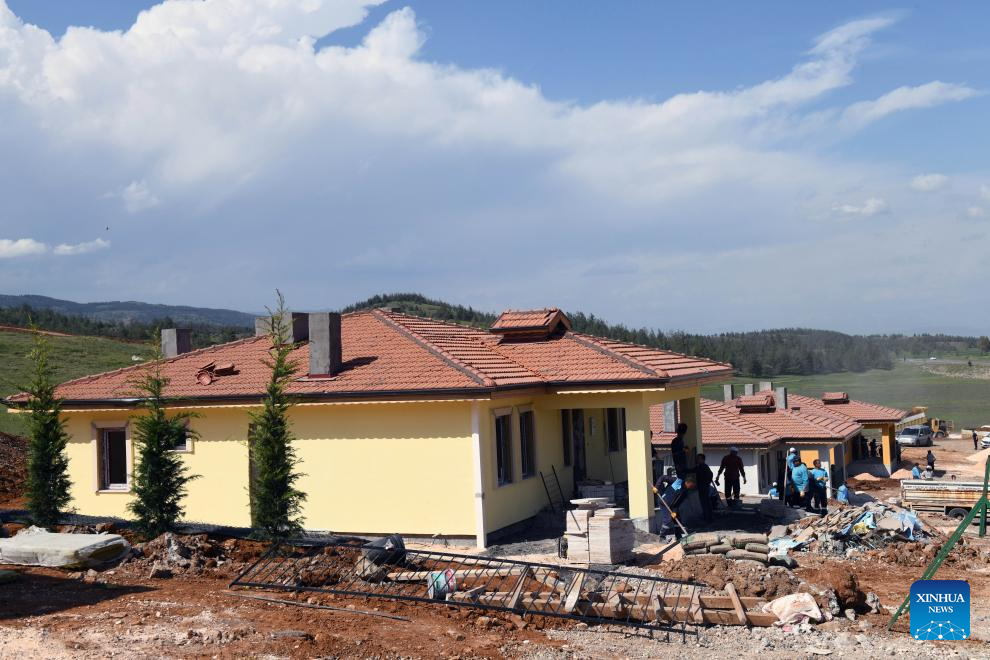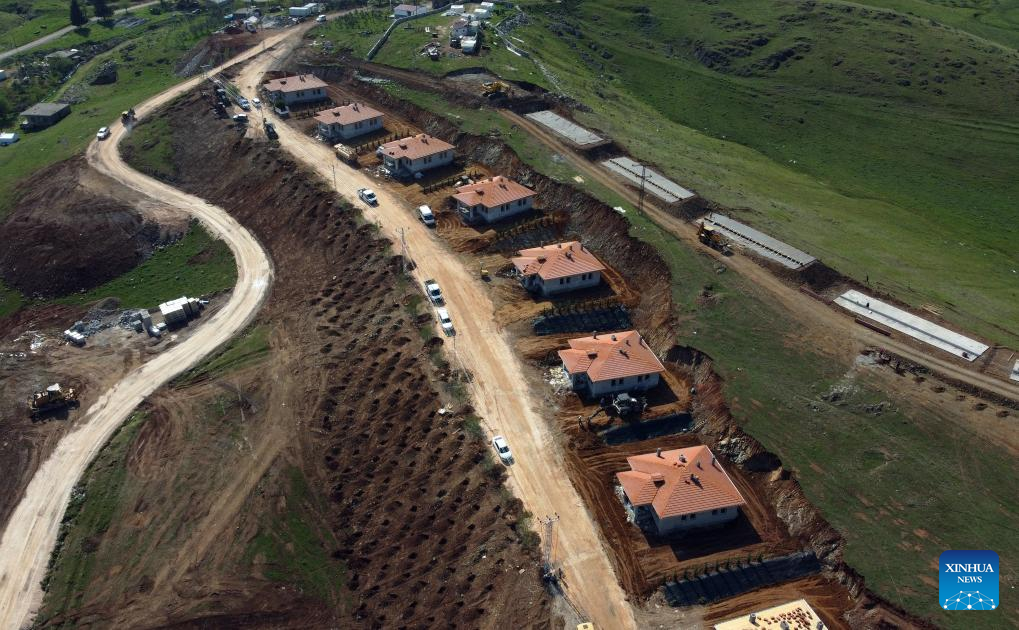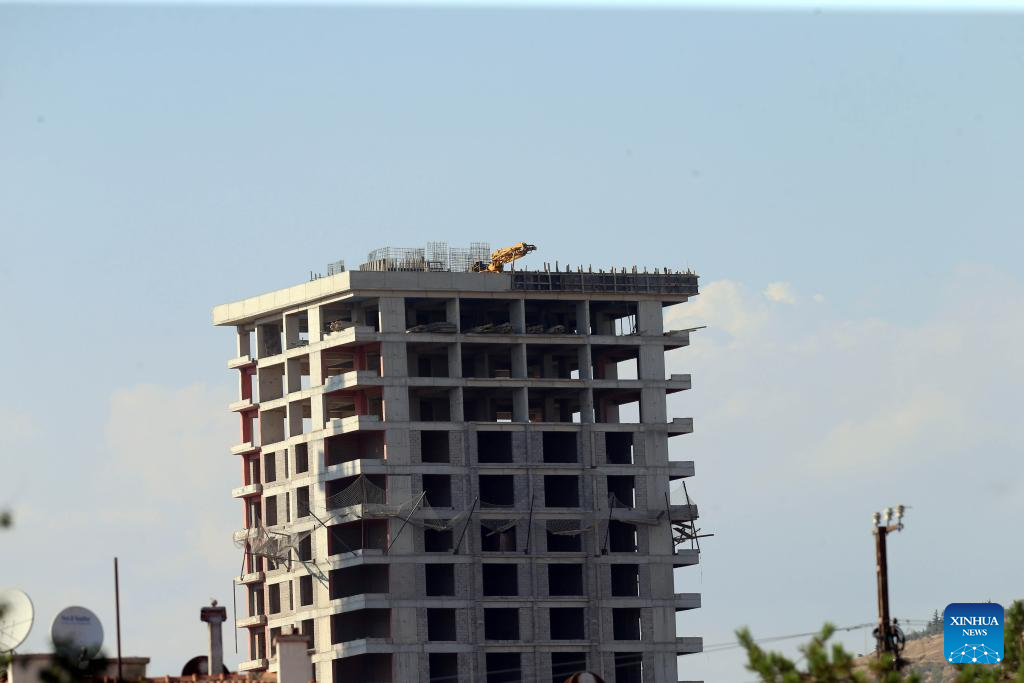Türkiye seeks 41 bln USD in global aid to bolster infrastructure, quake resilience

Photo taken on May 8, 2025 shows a construction site in Kahramanmaras, Türkiye. Facing the persistent threat of seismic activity and seeking to modernize its economy, Türkiye is asking global financial institutions for 41 billion U.S. dollars over the next three years to enhance disaster resilience, upgrade infrastructure, and promote green development. (Mustafa Kaya/Handout via Xinhua)
by Burak Akinci
ANKARA, May 9 (Xinhua) — Facing the persistent threat of seismic activity and seeking to modernize its economy, Türkiye is asking global financial institutions for 41 billion U.S. dollars over the next three years to enhance disaster resilience, upgrade infrastructure, and promote green development.
The request comes as experts emphasize the urgent need for safer urban environments, underscored by a recent earthquake near Istanbul.
Finance Minister Mehmet Simsek announced the funding target last month, following meetings with international monetary bodies in Washington. The financing, expected from institutions including the World Bank and the European Bank for Reconstruction and Development (EBRD), is aimed at addressing critical challenges facing the Turkish economy and its urban centers, Simsek said, describing it as long-term support for investments aligned with Türkiye’s goals for sustainable and inclusive growth.
The minister’s announcement came just days after a magnitude 6.2 earthquake struck near Istanbul on April 23. While structural damage in the country’s largest city and economic engine was largely minimal, the tremor, the most significant to hit the area in years, caused widespread panic and resulted in dozens of injuries as residents rushed to evacuate buildings.
The incident served as a stark reminder, officials and experts say, that bolstering disaster resilience is now a paramount funding priority.
“The Istanbul quake reminded us that the resilience of our cities cannot be delayed,” said Zeki Ulkenli, an assistant professor of city planning and urban design at Cappadocia University in central Nevsehir province.
But the scope of the financing extends beyond earthquake preparedness, Ulkenli noted. “We must think beyond earthquakes. This funding is also key to reducing carbon emissions, modernizing transport and digital infrastructure, and improving public health outcomes,” he added, suggesting that Turkish governmental bodies should enhance cooperation and strategic planning for a holistic approach to urban resilience, drawing on “good practices in urban sustainability in countries such as China or Japan.”
Home to more than 15 million people and generating nearly a third of Türkiye’s economic output, Istanbul remains particularly vulnerable. The megacity is situated close to the North Anatolian Fault, one of Türkiye’s most active seismic zones, and despite past efforts, many buildings do not meet modern safety standards.
The multi-billion-dollar initiative also signals a broader push by Turkish economic authorities to deepen engagement with multilateral institutions. This follows an economic policy shift initiated in mid-2023 under Simsek, which has seen Ankara adopt more market-friendly policies to regain investor confidence amid economic difficulties.
“While Türkiye already benefits from international development funding, the planned multi-year initiative would significantly scale up access,” said Senol Babuscu, a professor of finance at Baskent University in Ankara.
Türkiye has already begun receiving targeted international support in related areas. In early April, the EBRD provided a 28-million-dollar loan to the private lender Denizbank to help small and medium-sized businesses boost their digital capabilities. The government also anticipates funding from the European Union to support sustainable transport projects nationwide.
These funds are expected to be directed toward initiatives aimed at reducing disaster risk, fostering green innovation, and improving long-term economic productivity.
“Türkiye’s infrastructure deficit and environmental vulnerabilities require financing at a scale only global partnerships can provide,” Babuscu stressed. “These investments are essential if the country is to compete globally and protect its cities against future shocks, whether they are natural or economic.”
Experts highlight that with many buildings still non-compliant with modern safety or efficiency standards, the funding presents a significant opportunity to align disaster preparedness with green transformation. The goal, Ulkenli emphasized, is not only to retrofit existing structures for earthquakes but also to ensure they are more energy-efficient, manage water resources effectively, and emit less carbon.
Both Ulkenli and Babuscu pointed to the devastating twin earthquakes that struck Türkiye’s southeast in February 2023, which killed over 53,000 people in the country and thousands more in neighboring Syria. The disaster, the worst in Türkiye’s recent history, caused damage estimated at up to 100 billion dollars, according to government figures, leaving the country with a substantial reconstruction and recovery bill. Babuscu suggested that the new funding, if fully secured, could significantly aid in renewing Türkiye’s infrastructure in the wake of that catastrophe. ■

Photo taken on May 8, 2025 shows a construction site in Kahramanmaras, Türkiye. Facing the persistent threat of seismic activity and seeking to modernize its economy, Türkiye is asking global financial institutions for 41 billion U.S. dollars over the next three years to enhance disaster resilience, upgrade infrastructure, and promote green development. (Mustafa Kaya/Handout via Xinhua)

Photo taken on May 8, 2025 shows a construction site in Kahramanmaras, Türkiye. Facing the persistent threat of seismic activity and seeking to modernize its economy, Türkiye is asking global financial institutions for 41 billion U.S. dollars over the next three years to enhance disaster resilience, upgrade infrastructure, and promote green development. (Mustafa Kaya/Handout via Xinhua)

![Northwest Syria: United Nations cross-border operations from Türkiye to Syria (As of 30 November 2022) [EN/AR/TR] – Syrian Arab Republic Northwest Syria: United Nations cross-border operations from Türkiye to Syria (As of 30 November 2022) [EN/AR/TR] – Syrian Arab Republic](https://reliefweb.int/sites/default/files/styles/large/public/previews/0a/02/0a02d4d1-00eb-4f4b-8e68-cdb894f073e6.png)
